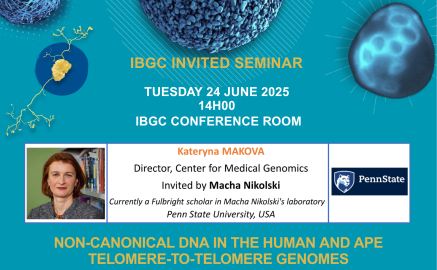"Non-canonical DNA in the human and ape telomere-to-telomere genomes"
Approximately 10% of the human genome can fold into 3D structures different from the canonical double helix, also called B-DNA. Non-canonical (or non-B) DNA structures regulate key cellular processes, such as transcription, splicing, and DNA replication. They also serve as mutational hotspots for point mutations and rearrangements during cancer. Yet the precise detection of non-B DNA has remained elusive due to its transient nature and incomplete genome sequences. Here, we analyze non-B DNA in the recently deciphered telomere-to-telomere (T2T) genomes of humans and great apes. First, we computationally predict motifs capable of forming non-B DNA. These motifs are enriched at the genomic regions added to T2T assemblies, including repetitive sequences, short arms of acrocentric chromosomes (where they may influence satellite dynamics), and centromeres (where they may contribute to centromere function). Second, we experimentally validate non-B DNA structure formation using Permanganate/S1 footprinting with Direct Adapter Ligation and sequencing (PDAL-seq). We show that clusters of different non-B DNA motifs–particularly direct repeats, G-quadruplexes (G4s), and Z-DNA–drive single-stranded DNA formation. PDAL-seq signal is enriched at promoters, enhancers, and 5’ UTRs, supporting a regulatory role for non-B DNA. Thus, non-B DNA is unevenly distributed across ape genomes and might have novel functions in previously inaccessible genomic regions. Finally, I will discuss the challenges in predicting the folding of non-B DNA structures in living cells and highlight the Artificial Intelligence approaches we currently undertake to address these challenges.
- A native of Ukraine, Kateryna Makova received her PhD degree from Texas Tech University, where she studied the genetic consequences of the Chernobyl Nuclear Power Plant accident. She then completed her postdoctoral studies at the University of Chicago, where she investigated differences in mutation rates between males and females, among other topics. She has been a Professor at Penn State University Department of Biology since 2003. Her laboratory conducts research in evolutionary and medical genomics. Current topics of interest include mitochondrial mutations, regional variation in mutation rates, sex chromosome evolution, evolution of non-B DNA, and childhood obesity. The research in Kateryna’s laboratory is highly interdisciplinary and collaborative. The group collaborates with statisticians, computer scientists, and biochemists. During her career, Kateryna has mentored 15 PhD students and 11 postdoctoral fellows, and has authored over 100 scientific manuscripts. Kateryna’s research has been continuously funded by the NIH since 2004. She currently directs the Center for Medical Genomics, which brings together researchers from the University Park and Hershey campuses of Penn State University. She serves as an Editor of Genome Research and has recently served as the President of the International Society for Molecular Biology and Evolution.
Plus d'informations
Dernière mise à jour :


